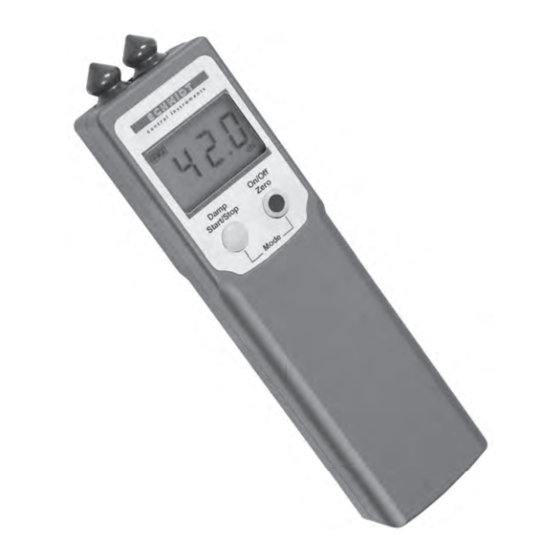
Subscribe to Our Youtube Channel
Summary of Contents for Schmidt PT-100
- Page 1 Edition PT 01.0.E PT Series Model PT-100 Operating Instructions PT-100-L Valid as of: 15.04.2011 • Please keep the manual for future reference!
-
Page 2: Table Of Contents
Contents 1 Warranty and Liability ....................3 1.1 Notices within the Operating Instructions ............... 3 1.2 Responsibilities of the Operating Company ............3 1.3 Responsibilities of the Personnel ................3 1.4 Informal Safety Measures ..................4 1.5 Training of the Personnel ..................4 1.6 Intended Use ...................... -
Page 3: Warranty And Liability
Warranty: - SCHMIDT tension meters are warranted for 12 months. Parts subject to wear, electronic components and measuring springs are not covered by the warranty. No warranty or liability will be accepted for bodily injury or property damage resulting from one or several of the following causes: - Misuse or abuse of the device. -
Page 4: Informal Safety Measures
The device is intended exclusively to be used for measuring tension, yarn speed and yarn length. Any other use or any use exceeding this intention will be regarded as misuse. Un- der no circumstances shall HANS SCHMIDT & Co GmbH be held liable for damage result- ing from misuse. -
Page 5: Available Models
Available Models These Operating Instructions refer to model PT-100 and PT-100-L of the PT Series. *SCHMIDT Measuring Range Measuring Range Measuring Range Model Calibration Tension Speed Length Material 0.5 - 100.0 cN PT-100 PA: 0.20 mm Ø 0.5 - 100.0 g PT-100-L 0.5 - 100.0 cN... -
Page 6: Unpacking
The ID plate with CE mark and serial number is provided on the bottom of the tension meter; the calibration label (optional) and the SCHMIDT Quality Seal are provided on the side. ID plate with serial number Calibration label fig. -
Page 7: Setup
Before you connect the AC adapter, verify that the supply voltage is correct (100 V - 240 V). HANS SCHMIDT & Co. GmbH provides no warranty or liability for any damage resulting from the use of AC adapters from other manufacturers. -
Page 8: Selecting The Units Of Measure
3.3.4 Selecting the Units of Measure You can set the instrument to cN or g for tension measurements and to m or inch for length measurements. The default settings are cN and m. Requirement: Tension meter switched off as described in Chapter 3.3.3. - Press and hold the ON/OFF key until the display shows the currently selected units of measure - Release the ON/OFF key and then press the DAMP key to select the units of... -
Page 9: Selecting The Operating Mode
3.3.6 Selecting the Operating Mode The following operating modes are available: • Tension mode (F) - PT-100 and PT-100-L • Length mode (L) - PT-100-L only • Speed mode (S) - PT-100-L only Requirement: - Tension meter switched on as described in Chapter 3.3.2. -
Page 10: Measuring In Speed Mode
3.4.1 Measuring in Tension Mode (Cont.) To insert the process material: - Place the PROCESS MATERIAL between the two rollers (fig. 3.4.1a). - Rotate the tension meter by approx. 180 degrees (fig. 3.4.1b). It is important to assure that the PROCESS MATERIAL runs smoothly over the ROLLERS. - Page 11 MAGNETIC SWITCH fig. 3.4.2a MAGNET The model PT-100-L features an adjustable counter for up to 10 cylinder revolutions of the knitting machine. The cylinder revolutions are monitored by a magnetic switch. To use this feature, the SUPPLIED MAGNET must be mounted to the cylinder of the knitting machine by using an M5 flat head bolt.
-
Page 12: Displaying The Average
3.4.3 Measuring in Length Mode (Cont.) Mounting example: Recommended switching distance approx. 2 mm LOCK NUT MAGNETIC SWITCH Flat head bolt (M5) ADJUSTING NUT MAGNET fig. 3.4.2b CYLINDER of CIRCULAR KNITTING MACHINE ANGLE BRACKET (not included) 1. Press and hold the ON/OFF key. The length mode settings are indicated on the display. -
Page 13: Activating Damping Mode
3.4.5 Activating Damping Mode Damping can only be activated and changed in the tension mode. The tension meter is equipped with an electronic damping which ensures steady read- ings when tension fluctuates. This is achieved by averaging the measured values at the set update rate. -
Page 14: Error Messages
All tension meters are calibrated with standard materials - such as polyamide monofila- ment (PA) - according to the SCHMIDT factory procedure. The diameters are given in Chapter 2. Any difference in process material size and rigidity from the standard material may cause a deviation of the accuracy.In 95% of all industrial applications, the SCHMIDT... -
Page 15: Static Verification Of Measuring Accuracy
ROLLS process material size and rigidity from the standard material may cause a deviation of the accuracy. In 95% of all industrial applications, the SCHMIDT calibration has been proven to provide the best WEIGHT results and is used for comparative purposes.The tension meter is factory calibrated for a vertical material path (fig. -
Page 16: Verification Intervals
6 Verification Intervals The question of finding the right frequency of calibration accuracy verification depends on several different factors: Operating time and load of the SCHMIDT tension meter Tolerance band defined by the customer Changes of the tolerance band compared to previous verifications of calibration Therefore, the interval between verifications must be determined by the user`s Quality Assurance Department based on the user`s experience.
















Need help?
Do you have a question about the PT-100 and is the answer not in the manual?
Questions and answers